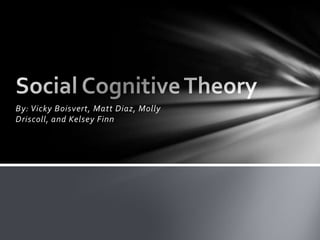
Social Cognitive theory
- 1. By: Vicky Boisvert, Matt Diaz, Molly Driscoll, and Kelsey Finn
- 2. What Is Social Cognitive Theory? • Social Cognitive Theory is acquiring symbolic representations through observation • Learning through imitation of observed behavior
- 3. Who Is Associated With Social Cognitive Theory? • Originated from Albert Bandura • Bandura believed in “reciprocal determinism,” that is the world and a persons behavior cause each other • Behaviorism states that one’s environment causes one’s behavior. Bandura, who was studying adolescent aggression, found this too simplistic, and so in addition he suggested that behavior causes environment as well. • Bandura soon considered personality as an interaction between three components: the environment, behavior, and one’s psychological processes.
- 4. Four Main Stages of Imitation • Bandura believed that there were four main stages of imitation involved in his Social Cognitive Theory: - Close Contact - Imitation of Superiors - Understanding of Concepts - Role Model Behavior
- 5. Necessary Conditions for Effective Modeling • Attention- various factors increase or decrease the amount of attention paid. Includes distinctiveness, affective valence, prevalence, complexity, functional value. One’s characteristics determine the amount of attention they’ll pay to certain subjects. • Retention- remembering what you paid attention to. Includes symbolic coding, mental images, motor skills. • Reproduction- reproducing the image. Including physical capabilities, and self-observation of reproduction. • Motivation- having a good reason to imitate. Includes motives such as past, promised, and vicarious.
- 6. Video of Bobo The Doll Experiment • http://www.youtube.com/watch?v=hHHdovKHDNU&fe ature=player_detailpage • In this video Bandura further explains how children learn behavior by observing.
- 7. How Can A Teacher Use This Theory In The Classroom? • A teacher can incorporate this theory in teaching children how to appropriately have a conversation • Often children do not understand that a conversation is a two way street. They need to learn that you must be patient and listen to others every now and then. A teacher can show a child this by telling children that there is no talking when the teacher is talking, or that you must raise your hand when you have something to say. • Through classroom interaction with the teacher and other students a child will learn: -To stay on topic -Make appropriate comments during the conversation -Understand how to initiate, maintain, and end a conversation.
- 8. How Can A Teacher Use This Theory In The Classroom? (Continued) • There can be many forms of non-verbal communication in the classroom. • Students can learn from their teachers and peers that certain symbols mean certain things. For example: thumbs up means “good job,” and holding two fingers up in the air may be the teachers symbol for “quiet.” • Students learn that stress, intonation, body movements, personal space issues, and eye-contact are all part of non-verbal communication.
- 9. How Can Technology Be Used In This Theory? • Teachers can apply this theory using technology by having students watch interactive videos. For example, shows like Dora the Explorer, Blues Clues, and Elmo are great with involving their viewers in their lessons and adventures. They do this by creating a problem and then asking a question on how to solve it, and then pause for a few seconds so that the children watching their show can answer themselves before they say the answer. • Another way teachers can involve technology is by having children watch a step by step how to video. For example, they can observe how to create a paper flower and then after watching the video create one themselves using the information that was provided for them on the video.
- 10. Our Opinion • We agree with Bandura, that Social Cognitive Theory is a way in which children learn how to behave. • By observing what our elders do or our peers, we tend to imitate them. • For this reason, when children are young we try not to expose them to people who may say or do inappropriate things around them because they may pick up on them and repeat them.
- 11. Credits: • http://www.istockphoto.com/microsoftclipartimages.php?xc=MP9004393 75 • http://webspace.ship.edu/cgboer/bandura.html • http://www.education.com/reference/article/social-cognitive-theory/ • http://psychology.about.com/od/developmentalpsychology/a/sociallearni ng.htm • Teachers Discovering Computers: Integrating Technology in a Connected World (7th Ed.), Shelly, Cashman, Gunter, and Gunter (2012).